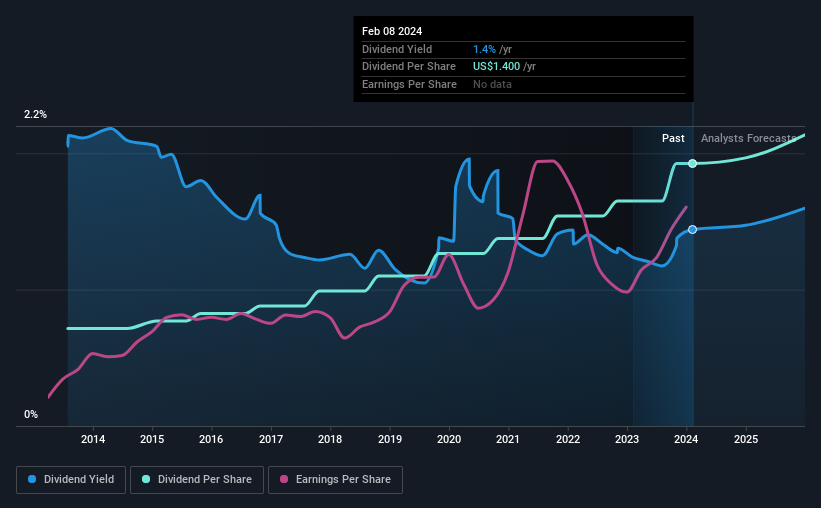Here's What We Like About Selective Insurance Group's (NASDAQ:SIGI) Upcoming Dividend
It looks like Selective Insurance Group, Inc. (NASDAQ:SIGI) is about to go ex-dividend in the next 4 days. The ex-dividend date is one business day before the record date, which is the cut-off date for shareholders to be present on the company's books to be eligible for a dividend payment. The ex-dividend date is important because any transaction on a stock needs to have been settled before the record date in order to be eligible for a dividend. Accordingly, Selective Insurance Group investors that purchase the stock on or after the 14th of February will not receive the dividend, which will be paid on the 1st of March.
The company's next dividend payment will be US$0.35 per share. Last year, in total, the company distributed US$1.40 to shareholders. Looking at the last 12 months of distributions, Selective Insurance Group has a trailing yield of approximately 1.4% on its current stock price of US$97.18. If you buy this business for its dividend, you should have an idea of whether Selective Insurance Group's dividend is reliable and sustainable. We need to see whether the dividend is covered by earnings and if it's growing.
Check out our latest analysis for Selective Insurance Group
Dividends are usually paid out of company profits, so if a company pays out more than it earned then its dividend is usually at greater risk of being cut. Selective Insurance Group is paying out just 21% of its profit after tax, which is comfortably low and leaves plenty of breathing room in the case of adverse events.
When a company paid out less in dividends than it earned in profit, this generally suggests its dividend is affordable. The lower the % of its profit that it pays out, the greater the margin of safety for the dividend if the business enters a downturn.
Click here to see the company's payout ratio, plus analyst estimates of its future dividends.
Have Earnings And Dividends Been Growing?
Companies with consistently growing earnings per share generally make the best dividend stocks, as they usually find it easier to grow dividends per share. If earnings decline and the company is forced to cut its dividend, investors could watch the value of their investment go up in smoke. For this reason, we're glad to see Selective Insurance Group's earnings per share have risen 14% per annum over the last five years.
Another key way to measure a company's dividend prospects is by measuring its historical rate of dividend growth. Since the start of our data, 10 years ago, Selective Insurance Group has lifted its dividend by approximately 10% a year on average. It's great to see earnings per share growing rapidly over several years, and dividends per share growing right along with it.
To Sum It Up
From a dividend perspective, should investors buy or avoid Selective Insurance Group? Typically, companies that are growing rapidly and paying out a low fraction of earnings are keeping the profits for reinvestment in the business. Perhaps even more importantly - this can sometimes signal management is focused on the long term future of the business. We think this is a pretty attractive combination, and would be interested in investigating Selective Insurance Group more closely.
On that note, you'll want to research what risks Selective Insurance Group is facing. For example, we've found 1 warning sign for Selective Insurance Group that we recommend you consider before investing in the business.
A common investing mistake is buying the first interesting stock you see. Here you can find a full list of high-yield dividend stocks.
Have feedback on this article? Concerned about the content? Get in touch with us directly. Alternatively, email editorial-team (at) simplywallst.com.
This article by Simply Wall St is general in nature. We provide commentary based on historical data and analyst forecasts only using an unbiased methodology and our articles are not intended to be financial advice. It does not constitute a recommendation to buy or sell any stock, and does not take account of your objectives, or your financial situation. We aim to bring you long-term focused analysis driven by fundamental data. Note that our analysis may not factor in the latest price-sensitive company announcements or qualitative material. Simply Wall St has no position in any stocks mentioned.

